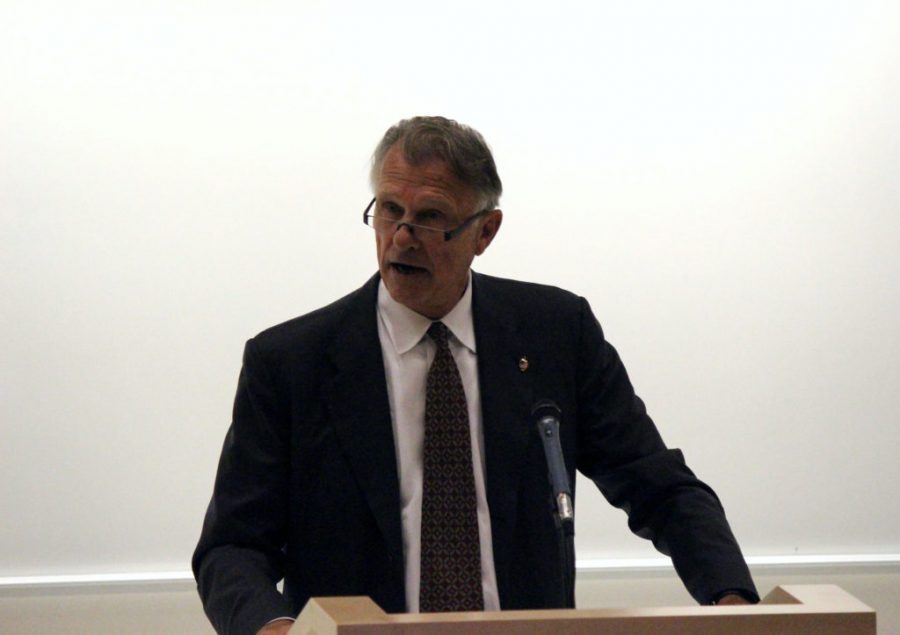Former CEO of Wells Fargo, Richard Kovacevich, touched on leadership success as well as topics of national discussion—including Wells Fargo’s recent fraud scandal – in his Spencer Fox Eccles convocation speech Wednesday morning.
Kovacevich, who filled in after current CEO John Stumpf cancelled to appear before the Senate banking committee, served as president and CEO of Wells Fargo from 1998 – 2007. He told the assembled business scholars, investors and bankers that learning from mistakes is crucial to success.
After being asked by a student to expand upon Wells Fargo’s recent fraud scandal, where roughly 5,300 employees were accused of opening fake credit cards – some of which incurred false fees – the former CEO addressed the controversy directly.
He noted, “What happened is entirely against the ethics, culture and business practices at Wells Fargo—entirely.”
After expressing his regret for the improper account openings, Kovacevich detailed more specific aspects of the situation.
“There are 100 thousand people in the company, 99 thousand have behaved totally appropriately,” Kovacevich said. “One thousand people a year and 5,000 people over five years have not. Is that too many?”
His remarks drew a mixed response, as some audience members shook their heads and mumbled “yes.”
Arthur Brief, Presidential Professor and chairman of Business Ethics, said, “Five thousand employees engaged in unsavory behavior is very size-able—clearly this is a corporate problem.”
Brief, who also served as a distinguished professor at Harvard Business School, explained that there are companies much larger than Wells Fargo and whose employees don’t engage in illegal activities.
“There’s a big difference between legal and ethical,” he added.
Wells Fargo’s plan to dismiss thousands of bankers while simultaneously shielding senior executives in the wake of its unauthorized accounts scandal was “despicable,” Sen. Robert Menendez said Tuesday at a Capitol Hill hearing.
Further questions from the audience shifted Kovacevich to discussing topics of leadership and advancement. He devoted a significant part of his speech to addressing four key points to business success—believing, affirming, motivation and leadership.
He charged that successful business leaders must believe in their colleagues, affirm them of their good work, have personal motivation and delegate rather than dictate.
On the topic of errors, he challenged students to appreciate mistakes—noting that making dire business mistakes has been key to his own triumphs as well as Wells Fargo’s.
“I learned much more from a mistake we made that can never happen again, and will be with me forever, than from any of the successes we’ve had,” Kovacevich said.
Kovacevich’s talk also had several lighter notes, mentioning the toughening job market and joking, “Today it is so much harder [than in the 60’s]. You guys just should have been born earlier.”
President Pershing acknowledged the accomplishments of the business school, noting that six programs have ranked top 25 nationally. Pershing’s main intention, however, was to pay tribute to ‘Spence’ Eccles, who sat front row.
Spencer Eccles and the Eccles family have donated over 15 million to the business school since 1991, when it was re-named after David Eccles—the first ever multimillionaire in the state.
The convocation event concluded with Kovacevich’s best advice–“get up very early” and “learn from mistakes.”
@kttbuda


